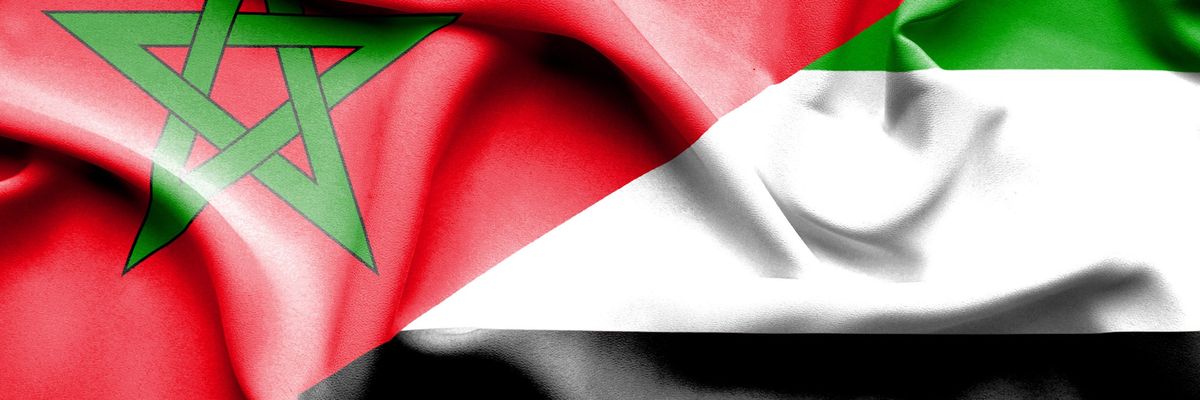In the past year, tensions have significantly heightened in Emirati-Moroccan relations. On March 16, 2020, Morocco recalled its ambassador from the United Arab Emirates (UAE), 11 months after Abu Dhabi withdrew its ambassador from Rabat. At this juncture, it is difficult to imagine these two Arab states resuming normal relations and overcoming the major issues fueling the friction between them.
The Qatari factor
The Abu Dhabi-Rabat divide has much to do with the Gulf Cooperation Council (GCC)’s Qatar rift, which originated with the decision by Bahrain, Egypt, Saudi Arabia, and the UAE to impose a blockade on Doha in June 2017. This unprecedented crisis in the GCC also involved a handful of other Arab/Islamic nations, including Mauritania, the Maldives, and Yemen, which joined the anti-Qatar bloc by cutting ties with Doha.
Yet Morocco never joined this bloc, notwithstanding efforts by Abu Dhabi and Riyadh to convince Rabat to do so. Instead, Morocco has maintained benevolent neutrality vis-à-vis the GCC crisis. Emblematically, in the early stages of the dispute, Morocco’s King Mohammed VI oversaw the air lifting of food supplies to Qatar in an attempt to help Doha cope with the blockade and the food security challenges it caused.
The participation of Moroccan forces in the Impregnable Guard 2020 military exercise in Qatar has created further tension in Emirati-Moroccan relations. Doha organized these maneuvers as part of its security preparations ahead of the 2022 World Cup. Other countries/alliances that participated included France, Jordan, NATO, Oman, Pakistan, Turkey, and the United States.
From Abu Dhabi’s perspective, Doha and Rabat deepening their security cooperation is an unwelcome development. Of the states blockading Qatar, it is clear that the UAE is more firm and rigid in its positions than the others. This is because Emirati leaders perceive political Islam as a grave threat and therefore view Qatar’s historic support for the Muslim Brotherhood negatively. The UAE’s rigidity was underscored by its opposition to any rapprochement with Qatar in late 2019, when many analysts expected an easing of tension between Qatar and Saudi Arabia in the lead up to December’s GCC summit in Riyadh.
The UAE’s anti-Muslim Brotherhood agenda
The tolerance that the Moroccan government has shown toward Islamist parties also factors into its problems with the UAE. In 2011, when the so-called “Arab Spring” uprisings shook the region and protests took place in Morocco, King Mohammed VI opted for a new constitution that significantly increased the powers of the prime minister. Since 2012 the Moroccan government has been controlled by the Islamist Justice and Development Party (JDP). The extent of the JDP’s popularity in Morocco is evidenced by its electoral successes in the post-2011 period. Thus, designating the JDP and all Islamist factions "terrorist” organizations is simply not an option for the Moroccan leadership given how much influence political Islam exerts in the North African country.
Meanwhile, the UAE is attempting to eradicate the forces of political Islam from the Middle East and North Africa. Abu Dhabi’s support for administrations in Cairo, Tobruk, and Damascus, which are largely based on shared interests in eliminating the Muslim Brotherhood and other Islamist factions from the region, highlight this reality. But the JDP’s popular support has made it impossible for Mohammed VI to suppress the party, as Emirati leaders might prefer. Moreover, pressure from the UAE’s anti-Islamist foreign policy has pushed Morocco in Qatar’s direction as the GCC crisis lingers without any resolution in sight.
Mauritania’s role
Mauritania is another variable in the Emirati-Moroccan equation. As the UAE is focusing on its long-term economic and geopolitical interests in Mauritania, Morocco has concerns. Last year, authorities in Rabat warned the Emiratis against increasing their investments in port and military facilities in Morocco’s neighbor. One issue in particular was a project designed to improve port facilities in Nouadhibou — a project Moroccan leaders view as competition to their Dakhla port and Tangier Med projects.
Last April, around the same time that Rabat was delivering its warning about Mauritania, Moroccan Foreign Minister Nasser Bourita visited all the GCC member states with the exception of the UAE. Allegedly, this move triggered Abu Dhabi’s decision to pull its ambassador out of Rabat. Meanwhile, the Emiratis have pressed ahead with their plans to strategically invest in Mauritania. As recently as February 2020, the UAE invested some USD 2 billion in various development projects across the country, including in Nouadhibou. The same month, Abu Dhabi welcomed Mauritanian President Mohamed Ould Ghazouani for a visit in which he met with powerful Abu Dhabi Crown Prince Mohammed bin Zayed Al Nayhan.
Unresolved conflicts of the Maghreb
Two ongoing crises in the Maghreb are also contributing to friction in Abu Dhabi-Rabat relations: the Libyan civil war and the conflict in Western Sahara. Although Morocco has maintained an officially “neutral” stance in the Libyan crisis, Rabat has somewhat recently taken a more pro-Tripoli stance. Of course, the UAE strongly supports General Khalifa Haftar’s Libyan National Army, which is allied with the Tobruk-based House of Representatives, and its material aid has significantly boosted the LNA’s ongoing offensive to try to capture the Libyan capital.
On August 23, 2019, officials in Rabat accused the UAE of backing the Polisario Front in the conflict over Western Sahara. They cited the fact that a Polisario leader made an appearance on a UAE-based news platform, the U.S. TV channel Alhurra. Al Quds Al-Araby reported that the Moroccan government read this as Abu Dhabi enacting revenge for Morocco’s lack of support for the blockade of Qatar.
The many unresolved conflicts, regional rivalries, strategic clashes, and ideological differences that have polarized the Sunni Arab world have left Morocco and the UAE in different camps and in many cases competing with one another. It is difficult to imagine their relationship not deteriorating further in the short term, given that these underlying sources of tension are unlikely to be resolved any time soon.
















